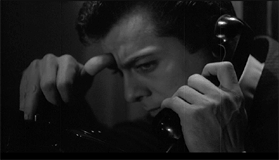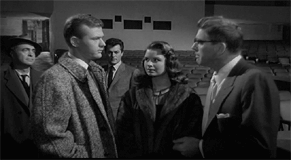Sweet Smell of Success (Alexander Mackendrick) 1957
 Sweet Smell of Success, one of
the best and last true film noir works, is one of the greatest of all films.
Clearly, itís script posses some of the sharpest dialogue ever written, and
even if itís not exactly naturalistic, itís stylized in the best sense. The
film takes place in a late-night New York, in which words can easily kill a
manís reputation, so it makes sense that the inhabitants of this world possess
almost inhumanly quick wits. The filmís villain, J.J. Hunsecker (Burt
Lancaster), is a thinly veiled caricature of real-life gossip columnist Walter
Winchell, and his power seems absolute. Everyone is aware that he is not afraid
to administer it mercilessly either, and as a result, he manages to build a
sense of menace before he even appears on the screen. When he finally does
appear, in a scene set at Twenty One (which still looks identical today), one
gets the impression that nothing his physical presence changes nothing. He was
presiding over the filmís events all along. Lancasterís a physically big
guy, and embodies Hunseckerís overbearing persona perfectly. Even better in
the film, though, is Tony Curtis who plays Sidney Falco, a sleazy, yet somewhat
successful talent publicist. Curtis generally possesses a nervous energy in his
work, and itís often distracting, but here that energy genuinely invigorates
the film. You get the impression that Falcoís pathetic scrambling for whatever
table scraps the fat cat Hunsecker lets him have is borne from a combination of
jealousy, self-loathing, and maybe even sexual attraction.
Sweet Smell of Success, one of
the best and last true film noir works, is one of the greatest of all films.
Clearly, itís script posses some of the sharpest dialogue ever written, and
even if itís not exactly naturalistic, itís stylized in the best sense. The
film takes place in a late-night New York, in which words can easily kill a
manís reputation, so it makes sense that the inhabitants of this world possess
almost inhumanly quick wits. The filmís villain, J.J. Hunsecker (Burt
Lancaster), is a thinly veiled caricature of real-life gossip columnist Walter
Winchell, and his power seems absolute. Everyone is aware that he is not afraid
to administer it mercilessly either, and as a result, he manages to build a
sense of menace before he even appears on the screen. When he finally does
appear, in a scene set at Twenty One (which still looks identical today), one
gets the impression that nothing his physical presence changes nothing. He was
presiding over the filmís events all along. Lancasterís a physically big
guy, and embodies Hunseckerís overbearing persona perfectly. Even better in
the film, though, is Tony Curtis who plays Sidney Falco, a sleazy, yet somewhat
successful talent publicist. Curtis generally possesses a nervous energy in his
work, and itís often distracting, but here that energy genuinely invigorates
the film. You get the impression that Falcoís pathetic scrambling for whatever
table scraps the fat cat Hunsecker lets him have is borne from a combination of
jealousy, self-loathing, and maybe even sexual attraction.
 The relationship between Falco and Hunsecker comprises the bulk of the film, but
it takes the time to establish a whole food chain of lowlifes as they try
scandalizing each other. You feel that everyone here, even Hunsecker, is
expendable. If he were to fall from grace, thereís little hope that the game
would be run any differently by his successor. That the film blames the world
instead of the villain for the way things are is what places it firmly in the
noir tradition, as well as the ammunition for much of the palpable satiric bite
that the film packs. It also makes Hunsecker a thoroughly complex villain. The
film never overtly says it, but Hunsecker is so overprotective of his sister
that incestuous implications wouldnít surprise. Clearly, the world of the
gossip columnists has an incestuous, symbiotic element to it. Hunsecker rankles
his nose when Falco suggests he needs publicists like himself in order to get
material for his column, but Falco is right, to a degree. What Falco is
neglecting though, is his own disposability, and thatís his biggest character
flaw.
The relationship between Falco and Hunsecker comprises the bulk of the film, but
it takes the time to establish a whole food chain of lowlifes as they try
scandalizing each other. You feel that everyone here, even Hunsecker, is
expendable. If he were to fall from grace, thereís little hope that the game
would be run any differently by his successor. That the film blames the world
instead of the villain for the way things are is what places it firmly in the
noir tradition, as well as the ammunition for much of the palpable satiric bite
that the film packs. It also makes Hunsecker a thoroughly complex villain. The
film never overtly says it, but Hunsecker is so overprotective of his sister
that incestuous implications wouldnít surprise. Clearly, the world of the
gossip columnists has an incestuous, symbiotic element to it. Hunsecker rankles
his nose when Falco suggests he needs publicists like himself in order to get
material for his column, but Falco is right, to a degree. What Falco is
neglecting though, is his own disposability, and thatís his biggest character
flaw.
The film thankfully
never descends into becoming a full-fledged crime flick. When the film begins,
you get the impression that Hunsecker will end up dead or disgraced by the
storyís end. He doesnít. Aside from a roughing-up or two, the biggest crime
in this film is slander. Most of the immorality on display is murkier that in
other film noir works. It might not be specifically illegal, but it is clearly
wrong, and as such it cuts closer to home for viewers that donít plot
insurance scams or arenít gumshoes. That uncomfortable relevance makes the
film stick with the viewer. The film was reportedly a financial flop upon its
release and has only recently been reappraised as a classic. Frankly, I find Sweet
Smell of Successí evisceration of Winchell is far more pungent, relevant,
and entertaining than Orson Wellesí Hearst bashing in Citizen Kane.
**** Masterpiece
11-29-01
Jeremy Heilman